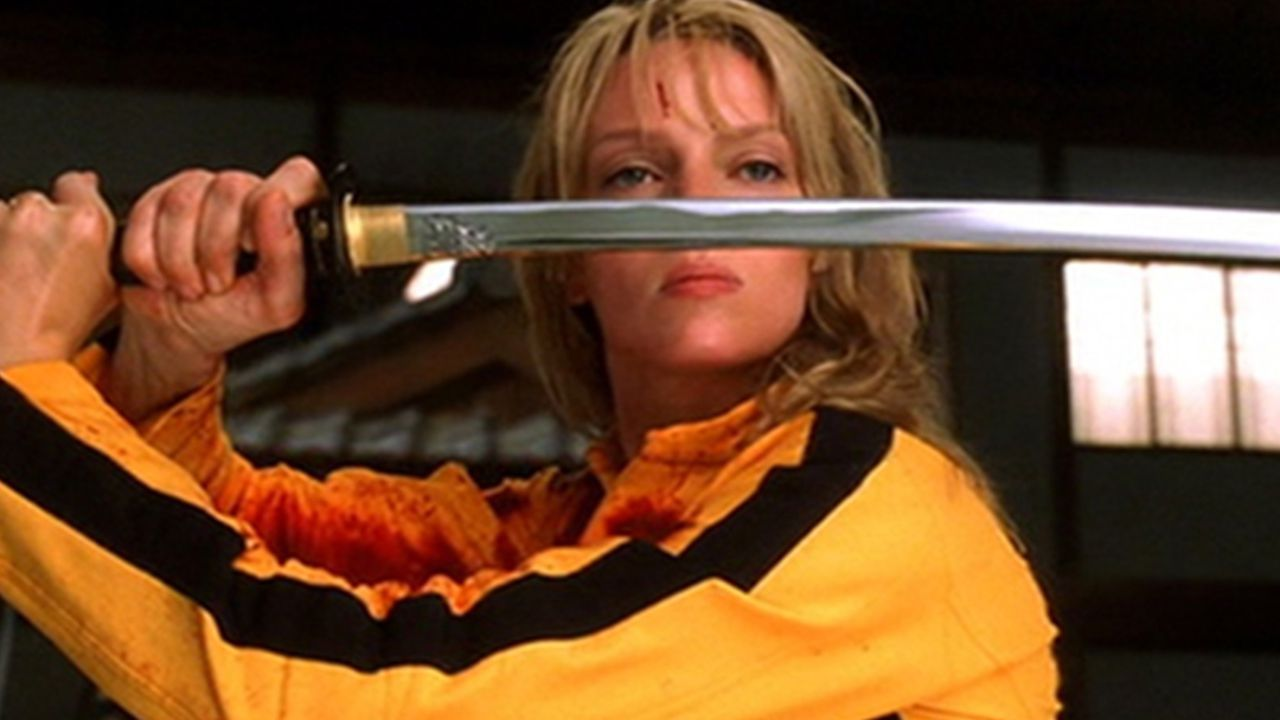 |
A publicity shot from Kill Bill 1 in which the Bride
fights the Crazy 88s with her Hatori Hanzo sword
|
Have you ever been mad enough to kill? I had a friend who had been badly betrayed by someone she loved. She told me had to confront that feeling--the absolute fury that rose up as the desire to kill her betrayer, a physical urge so strong that it was all she could do not to act on it.
I had never seen the
Kill Bill movies until this past weekend (December 9-10, 2023). It has recently been streaming on Amazon Prime so I watched through both parts 1 & 2. As I was watching the last half of
Kill Bill 2, my wife was in the room wrapping Christmas presents. This is not her kind of movie, so she had her back to the screen although she couldn't help turning around now and again to watch. After it was over, she asked "What is the movie about?"
Well, that is a good question.
Back in the early 2000s, Kill Bill had made its way into Evangelical discourse on the culture wars. They weren't asking "what is this movie about," but instead told us that it signaled the moral bankruptcy of "the world," the godlessness of American society that had kicked God out of the culture and lost its way.
Kill Bill was released in 2003, I was pursuing my MDiv at that time at a conservative Christian seminary and leading the youth group at a very traditional southern baptist church in rural Kentucky, neck deep in evangelical culture. I vaguely remember hearing about the movie and I am sure that I even talked about it in a sermon or a teaching lesson something in which I held up Kill Bill as a sign of moral depravity, the example of how bad the culture and our society was becoming, a moral cesspool of vulgarity and violence. I don’t remember where I heard this or picked this up specifically- on the internet, in someone’s sermon, a book on youth culture, classes at seminary? I’m not certain. But I picked it up somewhere and then just mindlessly repeated it -- there is no doubt in my retrospective memory that I was part of the Evangelical echo chamber, parroting this nonsense about Kill Bill, a movie I hadn't seen and knew nothing about. No doubt it simply a way to fit into the tribe, to feel certain and self-justified about how better “we” were than the rest of the world. This is the average Evangelical approach to cultural critique - talking about media that you really don’t know anything about or haven’t thoroughly investigated; ignorantly repeating the sound bites, what you’ve heard just to signal that you are as morally righteous as the next guy, that you are some sort of spiritual expert, by reducing complex things to stereotypes and simplicities.

Why didn't these Evangelicals pick up on the theme of family? Isn't this a pro-family movie, though embedded in a violent (and cartoonish) revenge story?
Now after watching Kill Bill on Amazon Prime, I think the real reason that Evangelicals had such a knee-jerk reaction to the movie had more to do with Evangelical misogyny and sexism than anything else.
The movie is about a woman who has escaped an abusive, controlling, manipulative relationship. She is pregnant and about to be married to new, seemingly loving if somewhat common, man. All she wants to be is a mom and a wife (the character's name is the Bride). But instead she is attacked, left for dead, abused and violated in horrific ways, betrayed and abandoned. The opening sequence accentuates her forsakenness and helplessness in the face of violent betrayal. In her desperate condition -- no one -- no one is there to support, comfort, or help her. There is no compassion towards her at all. Every other character simply wants to cause her pain and kill her. She is all alone. Scene after scene in these movies elaborate on the social violence and misogyny against women that we tolerate. (Only t
he retired sword maker Hatori Hanzo comes to her aid and treats her with dignity, and empowers her for revenge.)
And this Evangelical critique also shows no compassion. These pastors and youth pastors who denigrated this movie could instead have come to the side of the Bride. The critique could have been and should have been thus: "No woman should be treated this way. We repent of our own misogyny and abandonment of women. We no longer want to be part of the problem, but will support and serve women instead of abandoning and abusing them."
When one is abandoned, betrayed, and forsaken, when one's power and dignity has been taken--one has to stand up for herself. I am just thinking of my friend who was also alone in her betrayal. So the Bride's acts of revenge are her attempts to acknowledge the wrongs done to her. She will not be put aside, eliminated, buried alive. She will hold others accountable for their sins and try to make some justice for herself since there is no one to help. The Bride's savagery is the wrath of God enacted on the wicked.
But a strong woman fighting back against her suffering, against her abusers, against the unfairness of the society woman that has used and abandoned her -- I think that made Evangelicals uncomfortable.






No comments:
Post a Comment